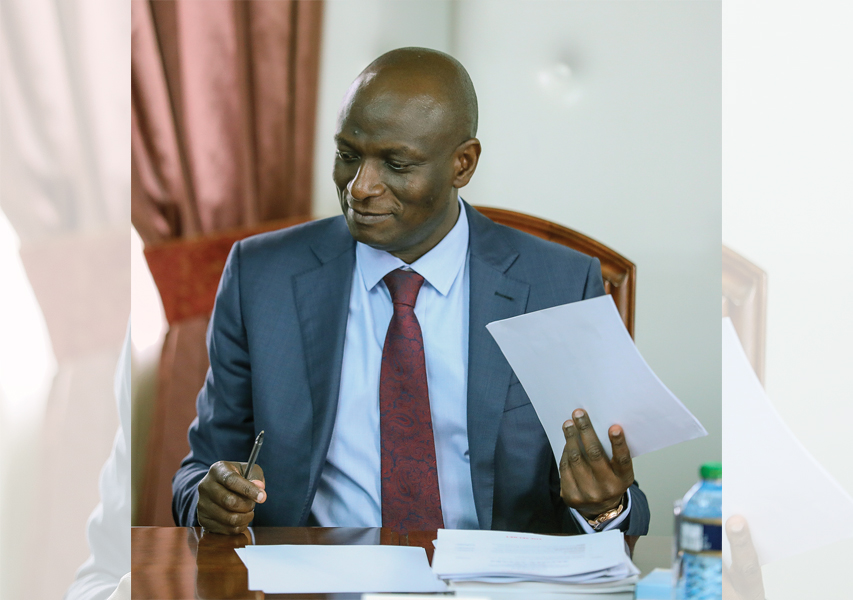
Charles Cheruiyot Keter was not among the first choices for Cabinet slots when Jubilee Party came to power in 2013. However, he would go on to become one of the longest-serving Cabinet secretaries for Energy despite joining the government slightly over two years after its inauguration.
Charles Cheruiyot Keter was not among the first choices for Cabinet slots when Jubilee Party came to power in 2013. However, despite joining the government slightly over two years after its inauguration, he would go on to become one of the longest-serving Cabinet Secretaries for Energy and Petroleum since Kenya gained independence.
By the time he was moved to the Ministry of Devolution in October 2021, the Kericho-born veteran politician had served for close to seven years in the Energy docket, becoming one of its longest occupants since Kenya gained independence.
He would not stay long in Devolution as he quit four months later to vie for the Kericho governorship.
The Kericho-born veteran joined politics after resigning from a managerial position in Kenya Posts and Telecommunications Corporation. He contested for the parliamentary seat for Belgut Consitutency and won, defeating his predecessor Charles Kirui who was a two-term MP for Belgut.
Although he was still in the shadows of more prominent political figures in the South Rift such as the Late Kipkalya Kones, Franklin Bett and John Koech, Keter would slowly carve out a political niche that enabled him to defend the seat in 2007 with ease.
During this period, he had forged a close friendship with William Ruto and was also working closely with Uhuru Kenyatta in the Public Accounts Committee in Parliament. They, together with other senior political figures from the region, had joined the Orange Democratic Movement (ODM) led by Raila Odinga, and become a party pillar in the Rift Valley. As part of the power-sharing pact between President Mwai Kibaki and Raila following the 2007 post-election chaos,
Keter was included in the coalition government, as the Assistant Minister for Energy, but he lost his job courtesy of political differences between Ruto and Raila over conservation issues in Mau Forest and cases to do with post-election violence that had been brought before the International Criminal Court. Ahead of the 2013 General Election, Keter, opted to vie for the Kericho County senatorial seat instead of trying his luck with the uncertain government positions if Jubilee won the polls. He won the seat easily, trouncing notable competitors.
Less than two years into the new administration, however, a corruption scandal saw a number of Cabinet Secretaries relieved of their duties, among them; Davis Chirchir, the Cabinet Secretary for Energy and Petroleum, Felix Koskei (Agriculture), Charity Ngilu (Lands), Michael Kamau (Transport) and Kazungu Kambi (Labour).

With the apparent lack of senior political figures from the South Rift region, Keter was plucked from the Senate and implored to resign to take up the vacant position in the Ministry of Energy and Petroleum. Keter enjoyed the added advantage of having already served as Assistant Minister for Energy between 2008 and 2010 and completed ‘the face of Kenya’, as the President and his deputy were still eager not to upset the balance of power sharing in their support bases that they had sought to include in their Cabinet.
Ahead of the 2013 General Election, Keter was one of the founders of the United Republican Party (URP), which joined hands with Uhuru Kenyatta’s The National Alliance (TNA) to form the Jubilee Alliance that formed the government after the elections.
Keter was, therefore, an obvious pick for CS, although the choice was met with resistance from some who questioned the need to spend billions of shillings on a by-election to replace him in the Senate. Keter formally resigned from the Senate on 17 December 2015 and was replaced by Aaron Cheruiyot, who being a first-time politician trounced a respectable field of aspirants in a hotly contested by-election.
Keter’s appointment to Cabinet came at a time when Uhuru as President had experimented with a technocratic Cabinet — a demand of the 2010 Constitution — and had expressed a desire to inject some political mastery into the mix by including formerly elected leaders as Cabinet Secretaries.
The former Kericho Senator was joining former Mvita MP Najib Balala, who had been appointed at the beginning of the Jubilee administration in 2013 and Ngilu, who ended up stepping aside as CS for Lands.
At the Ministry, Keter found Dr. Joseph Njoroge as the Principal Secretary (formerly KPLC MD & CEO). Njoroge had been picked by Uhuru in 2013.
The two would work together until they were both transferred in October 2021. Upon taking over, the CS was immediately entrusted with the implementation of flagship projects of the Jubilee Administration: The Last Mile Connectivity project, The Public Streetlighting project, power generation projects, key transmission lines and the Electrification of Public Primary Schools (which supported the Digital Learning Program). In the Petroleum docket there were the critical pipelines under KPC (Line 5, Mombasa-Nairobi and Line 6, Sinendet-Kisumu), the Crude Oil Pipeline (which later introduced the Early Oil Project) and the Kisumu Oil Jetty. Keter, proved to be a practical hands-on CS who completed most of the projects he inherited and others during his tenure.
Frequently seeing him at the project sites with engineers and contractors was a sight that the sector had become accustomed to. The Last Mile Connectivity, sought to connect thousands of Kenyans, especially those from humble backgrounds in the remotest hamlets, to the national power grid. It was quite an ambitious programme that hoped to have at least 70 per cent of all Kenyans connected by the end of 2017.
The project recorded almost instant success as the number of households connected to electricity increased from 2.3 million in 2013 to 6.2 million during Uhuru’s first term in office. By at the end of his second term, connection was to 8.5 million households which accounted for over 75 per cent connectivity, that surpassing the target of 70 per cent access. The Public Street Lighting Project saw all the major towns in Kenya enjoy a 24-hour economy, a project that saw the crime rates notably reduce. The stability and reliability of power was also significantly enhanced by the completion of several critical transmission lines, the major ones being the Nairobi-Mombasa line and the Olkaria-Lessos-Kisumu lines which opened up the Coast and Western region to a higher reliability and uptake of power.
Keter’s tenure also saw Kenya’s energy sector launched onto the global map, other than for the tremendous progress in electricity access. To begin with, through the increase of KenGen geothermal power plants, Kenya moved from position nine to six globally in geothermal power development. The commissioning of the largest wind farm and the largest solar plant in Eastern Africa (Lake Turkana Wind Power and Garissa Solar Plant) in addition to the geothermal power illuminated Kenya to becoming the few countries globally to be utilizing 90 per cent of renewable energy on their power grid, a commitment made and fulfilled by President Kenyatta during the United Nations General Assemblies and the UN Climate Change Conferences.

On the flipside, Keter’s tenure at Energy was ridden with dozens of scandals that put the CS on the spot although he was never personally fingered for any of them. In 2018, Keter faced the biggest challenge of his stint as the Energy CS when the government began a renewed crackdown on graft within State Departments and Agencies. Kenya Power and Kenya Pipeline Company, both parastatals under the Ministry of Energy and Petroleum, were some of the agencies on the investigators’ radar.
In July of that year, the newly appointed Director of Public Prosecutions (DPP), Noordin Haji, ordered the arrest and prosecution of senior Kenya Power officials who had been accused of conspiring to acquire faulty transformers that cost the utility firm an estimated KES 4.5 billion in losses.
On top of having top executives — including Managing Director Ken Tarus, his predecessor Dr. Ben Chumo and the Company Secretary, Beatrice Meso — arrested, the DPP also ordered the prosecution of 33 directors of firms that were awarded questionable tenders.
In July 2018, Kenya Pipeline Company Managing Director Joe Sang was also shown the door following an alleged oil spillage scandal. But perhaps the most notable scandal during Keter’s tenure was the reported manipulation of Kenya Power bills that emerged in 2020, and that was said to have led to the overcharging or undercharging of customers by rogue staffers. The staff tasked with developing monthly bills were blamed for working in cahoots with senior officials to generate fake electricity tokens. A total of Ksh1 billion could have been lost.
In October 2021, the President made changes at the ministry. The mini-reshuffle saw Keter replaced by Monica Juma, who moved from the Ministry of Defence. The changes to the Energy docket followed an Executive Order on the reduction of energy costs following a public outcry about the high costs of electricity in the middle of the Covid-19 pandemic. The President issued the order after receiving a report and recommendations by the Presidential Taskforce on Power Purchase Agreements (PPA).
Among the recommendations in the report was a reexamination of agreements between Kenya Power and Independent Power Producers found to have been highly skewed in favour of the latter. It was against this backdrop that the President was advised to make changes at the ministry to ensure smooth implementation of the report recommendations.
Kenya is one of the global leaders in sustainable power. But despite improvements in customer connections, the uptake of renewable energy – which is more than three times the global average – and high capital investment, high pricing was hurting the country’s transition to an energy-secure state.
Njoroge, Keter’s PS, was replaced by Gordon Kihalangwa who was moved from the Ministry of Public Works where he served in a similar capacity. At the Ministry of Devolution, Keter replaced Eugene Wamalwa, who had been moved to Defence to take over from Juma. The CS resigned shortly after his new appointment to run for the governorship of Kericho County.
As he quit government once again to rejoin politics in February 2022, he awarded himself excellent marks for his performance at the Ministry of Energy, saying he had achieved what he had been assigned to do.
“I wish to sincerely thank the President for according me the opportunity to serve in his Cabinet since 2015. With diligence, commitment and determination, I served as Cabinet Secretary for Energy and Petroleum until 2018, when I was reappointed to the Energy portfolio. During my tenure, tremendous increase in electricity access (over 75 per cent), increased power generation (2,912 MW) and construction of transmission lines were recorded,” said the CS in a statement he issued on 8 February 2022.
At the end of the day, when the story of lighting up Kenya is told —most of it under the Uhuru presidency — the story of one Charles Cheruiyot Keter’s contribution will be more than just a footnote.

GRutto says:
This is a man who get the job done… you did well Boss
Anonymous says:
The best serving CS I ever came across. Even to date, national government is your place Sir. You are well acquitted for the same.